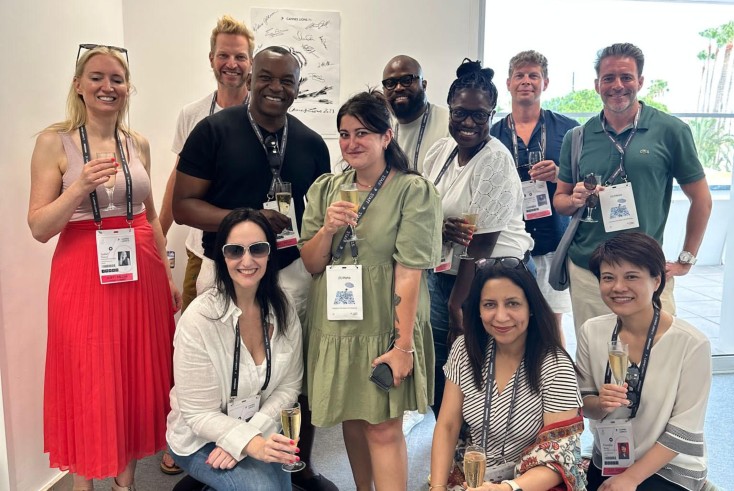How two New Zealand campaigns stood out for media craft at Cannes

Two notable ad campaigns from New Zealand were celebrated for their traditional media craft and creativity by this year’s Media Lions jurors.
Partners Life, an Auckland-based insurance company, created a disruptive TV campaign with a difference called The Last Performance, challenging New Zealanders to break their own cultural taboo and think about life, death and insurance.
Insights from Partners Life and agency Special found that New Zealand is one of the most under insured countries in the world, with only 29% holding policies. Traditional advertising was found to be the weakest motivational trigger for the sector and that life-loving New Zealanders were reluctant to engage in anything to do with death itself, with the one exception being when it appeared in TV and films as entertainment.
So, the media partnership activated where people were already engaging with it, around the country’s highest-rated murder mystery show, The Brokenwood Mysteries. The Last Performance ended up being a subversive life insurance campaign masquerading as a TV series, where the murdered characters wake from the dead to share their regrets about not being ready for the unexpected.
All six deaths from six episodes of the TV drama were brought back before the credits rolled for one ‘last performance’ — using the same actors, same director, same crew, and same sets in the show. The dead characters reminded people that life isn’t scripted so plan ahead and “get life right”.
It resulted in 70% of New Zealanders “believing in the importance of having life insurance,” brand awareness increased to 29% — the highest awareness score for Partners Life in three years, while website enquires were up by 70%.
“The Last Performance is a brilliant example of a media hack and creativity in action and a worthy Gold winner,” said Media Lions juror Enyi Nwosu, chief strategy officer at IPG Mediabrands’ UM London.
“Built from a compelling insight and superbly executed with strategic media placement and immersive content around one of New Zealand’s most popular murder mystery shows. You only need to look at the results to see just how effective and impactful this tongue-in-cheek campaign has been. Wonderful imagination and media negotiation.”
Skinny’s ‘refreshing’ approach to radio
Another campaign singled out for praise last week was for telecoms company Skinny and PHD Auckland, a partnership that won a Media Gold Lions in the ‘Use of Channel Integration’ category for Skinny — Phone It In. Significantly, the Gold trophy was the only one handed out in the new category open to media agencies.
Phone It In was a low-cost campaign developed by Colenso BBDO, that encouraged New Zealanders to record Skinny radio ads on their mobile phone, for free. Hundreds of Skinny radio scripts were published around the country. From standard placements like outdoor billboards and regional newspapers, to takeaway coffee cups, bar coasters, movie screens, 3am TV spots, social, and a street poster blitz.
Each ad included an 0800 number that takes callers to the automated Skinny Radio Ad Recording Service (which is essentially an answering machine). From there, the recordings are given the trademark Skinny mnemonic and dispatched as radio ads.
Each script was contextually relevant to its location, leading to bespoke placements around the country. The end result was an out-of-home campaign, that doubled as a radio campaign, that tripled as a cost-effective way to tell the nation about Skinny’s incredible mobile network and low prices.
It resulted in 22 hours of free radio ads and a 34% increase in sign-ups to Skinny — the brand’s most effective recruitment campaign in its history.
Dozie Okafor, managing director, PHD Nigeria, said: “It was so refreshing to see something that wasn’t chasing AI or the metaverse and at its core had real media. Radio isn’t as sexy as it used to be, and people are not putting in a lot of radio entries, so when we stumble on this case it’s something we paused and looked at.
“Firstly, having the idea of integrating out-of-home with radio isn’t very common, and getting consumers to be the adverts is a unique way of getting people to engage with your work, and the use of humour was right on point. Another thing that stood out for me was how they integrated out-of-home, with tailor-made copy. When we looked at all the criteria, the media was all over it driving the integration.”
Reflecting on a busy week locked in the Palais, UM London’s Nwosu believes that the Media Lions have never been so important. He said: “It matters even more now for attracting and retaining the brightest and the best to our industry, at a time when we are living through ‘the great resignation’ and ‘quiet quitting’. Celebrating our work is critical to making sure we remain a place for talent to show up and believe they can play a part in developing world class ideas.
“Unsurprisingly, we saw AI-inspired creativity, often used to connect the past and the present in very innovative ways. We saw brilliant work which directly tackled the climate crisis and the recruitment challenges faced by all industries. We were very inspired (and pleasantly surprised) by the level of innovation in the more established channels of print and outdoor.
“And we saw what we described as brilliant ‘media hacks’ where media teams had found never-been-done-before opportunities within channels and environments, with impressive results. Reminding us all, that everything is possible.
Why Dove’s anti-TikTok filter #TurnYourBack won the Media Lions Grand Prix
“Having spent my working life equally on the creative and media side, you would expect me to say this, but having creative and media working together produces more impactful solutions.”
The Media Lions celebrate work that is enhanced and amplified by a game-changing channel strategy that takes consumers on new journeys. This year, 1,853 entries were received and 60 Lions were awarded by the Jury: 10 Gold, 17 Silver, 32 Bronze and the Grand Prix was presented to ‘#TurnYourBack’, for Dove, by WPP agencies Ogilvy (London_ and David (Madrid).
 Arif Durrani is director of Reuters Plus, Reuters’ commercial content studio. He is also an international media consultant and freelance writer. He previously worked as Bloomberg Media’s executive editor for EMEA. @DurraniMix
Arif Durrani is director of Reuters Plus, Reuters’ commercial content studio. He is also an international media consultant and freelance writer. He previously worked as Bloomberg Media’s executive editor for EMEA. @DurraniMix



